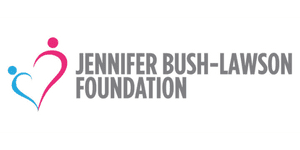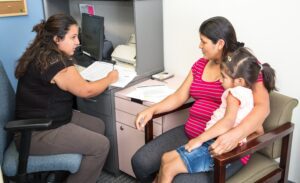
A continuation of our series highlighting the issues affecting the low-income moms gaining access to quality health care.
Arlington County has a wealth of resources, but data shows the percentage of women in the county who start receiving prenatal care in the first trimester of pregnancy has consistently fallen below the state average. In the county, only around 61% of women initiated prenatal care during the first trimester in 2018, whereas Virginia’s state average was around 78-79%. Many moms can’t access the kind of care they want – and deserve – for themselves and their babies. Through conducting research and funding innovative programs that increase access to care, the Jennifer Bush-Lawson Foundation aims to change Arlington County’s statistics.
The low-income women the foundation serves most often experience obstacles to care, including being underinsured, transportation issues, lack of willing healthcare providers, language barriers, childcare needs, and the consequences of missed work. These factors and more have led mothers to seek care outside of the county or start care well into their second trimester. Organized research can help us learn about our community, and to learn about the journeys many mothers embark on when preparing to have a baby. Conducting research can also inform long-term change, where we can care for prenatal and postnatal patients at a higher capacity to support overall health, while reducing the risk of complications that affect both mother and baby.
In 2022, the Jennifer Bush-Lawson Foundation began a multi-phase project that fully reviews the state of maternal health for low-income women in Arlington to help give insight into where additional needs exist throughout the county. This first phase includes a survey of this community to inform next steps and recommendation development. The challenge is uncovering why low-income, uninsured women in the county aren’t being served early in pregnancy, and what is keeping these women from initiating care in the first trimester.
There is an opportunity here: to better serve our low-income moms and increase access to health care. These goals can become a reality through our innovative programs and detailed research. JB-LF has successfully and consistently troubleshooted gaps in women’s health care in the Arlington County hospitals and clinics, as well as raised funds to introduce solution-based programs. In wanting to see better statistics for Arlington women initiating first trimester care, JB-LF is giving low-income pregnant women renewed hope by increasing access to much needed health care support. Our 2022 research has goals of sparking systemic change, and through the collection of feedback and data, we hope to accomplish just that.



